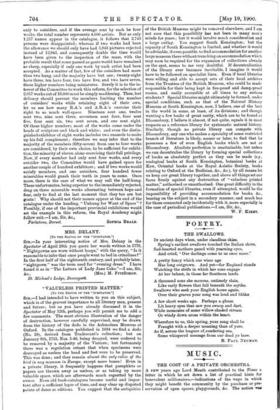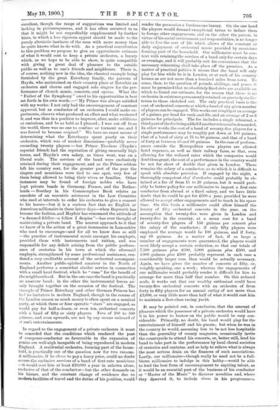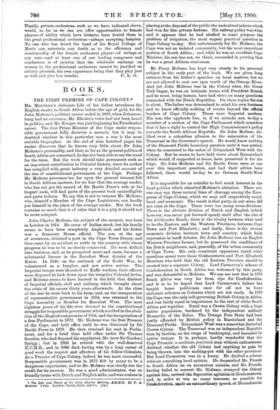M U S I C.
THE COST OF A PRIVATE ORCHESTRA.
A FEW years ago Lord Meath contributed to the Times a letter in which he set down a list of practical hints for benevolent millionaires,—indications of the ways in which they might benefit the community by the purchase or pre- servation of open spaces, playgrounds, &c. The notion was excellent, though the range of suggestions was limited and lacking in picturesqueness, and it has often occurred to us that it might be not unprofitably supplemented by further hints, in which a less rigorous appeal should be made to the purely altruistic instincts of the man with more money than he quite knows what to do with. As a practical contribution to this problem we propose to give an approximate estimate of what it would cost to keep a private orchestra, a luxury which, as we hope to be able to show, is quite compatible with giving a great deal of pleasure to the outside public as well as to one's friends and neighbours. There is, of course, nothing new in the idea, the classical example being furnished by the great Esterhazy family, the patrons of Haydn, who maintained on their country place at Esterhez an orchestra and chorus and engaged solo singers for the per- formance of church music, concerts, and operas. What the "Father of the Symphony" owed to his opportunities is best set forth in his own words :—" My Prince was always satisfied with my works: I not only had the encouragement of constant approval, but as conductor of an orchestra I could make ex- periments, observe what produced an effect and what weakened it, and was thus in a position to improve, alter, make additions or omissions, and be as bold as I pleased ; I was cut off from the world, there was no one to confuse or torment me, and I was forced to become original." We have no exact means of determining what the Esterhazys spent yearly on their orchestra, which was of modest dimensions—probably never exceeding twenty players — but Prince Nicolaus (Haydn's especial friend) had the reputation of giving unusually high terms, and Haydn's own salary, as times went, was on a liberal scale. The services of the band were exclusively retained during their engagement, and as the Prince seldom left his country seat, for the greater part of the year the singers and musicians were tied to one spot, very few of them being allowed to bring their wives or families. Other instances may be found of foreign nobles who have kept private bands in Germany, France, and the Nether- lands — Southey in his Commonplace Book relates an anecdote of an eccentric aristocrat in the Low Countries who used at intervals to order his orchestra to give a concert to his horses—but it is a curious fact that no English or American millionaire in these latter days—when Bayreuth has become the fashion, and Mayfair has renounced the attitude of "a damned fiddler—a fellow I despise "—has ever thought of maintaining a private band. The nearest approach to it that we know of is the action of a great ironmaster in Lancashire who used to encourage—and for all we know does so still —the practice of instrumental music amongst his employes, provided them with instruments and tuition, and was responsible for any deficit arising from the public perform- ance of oratorios in his town at which the aforesaid employes, strengthened by some professional assistance, ren- dered a very creditable account of the orchestral accompani- ments. Another public-spirited amateur in the North of England performs a somewhat similar service in connection with a small local festival, which he " runs " for the benefit of the neighbourhood. But in the one case the band is practically an amateur band : in the other the instrumental forces arc only brought together on the occasion of the festival. The example of Prince Esterhazy and other German Princes has had no imitators in modern England, though in the course of the London season as much money is often spent on a musical party, at which three or four operatic " stars " are engaged, as would pay for half-a-dozen, or even ten, orchestral concerts with a band of fifty or sixty players. Fees of 100 to 500 ;mimes, and even upwards, are not by any means unheard of it sued entertainments.
In regard to the engagement of a private orchestra it must be conceded that the conditions which rendered the post of composer-conductor so favourable to the expansion of genius are well-nigh incapable of being reproduced in modern England. A residential orchestra, forming part of the house- hold, is practically out of the question now for two reasons. A millionaire, if he chose to pay a fancy price, could no doubt secure the exclusive services of a band of first-rate musicians —it would cost him at least 210,000 a year in salaries alone, exclusive of that of the conductor—but the other demands on his leisure, and the constant change of residence due to modern facilities of travel and the duties of his position, would
render the possession a burdensome luxury. On the one hand the players would demand exceptional terms to induce them to forego other engagements, and on the other the patron, in virtue of his social environment and responsiblities, is no longer able to live the sort of life which allows of the constant or daily enjoyment of orchestral music provided by musicians forming part of the household. Our millionaire must be con- tent with retaining the services of a band only for certain days or evenings, and it will probably suit his convenience that the necessary rehearsing shall take place off the premises. As a matter of practical politics it means that the band will only play for him while he is in London, or at such of his country houses as are not more than a hundred miles from town. To come, then, to the question of pounds, shillings, and pence, it must be premised that no absolutely fixed data are available on which to found our estimate, for the reason that there is no orchestra in existence permanently retained on precisely similar terms to those sketched out. The only practical basis is the cost of orchestral concerts at which a band of any given number of players can be engaged. This works out roughly at an average of a guinea per head for rank-and-file, and an average of 2 or 3 guineas for principals. The fee includes a single rehearsal, a third part of the fee being added if another rehearsal is demanded. In other words, the cost of a band of seventy-five players for a single performance may be roughly put down at 100 guineas, that of a band of sixty at 75 to 80 guineas, and that of a band of forty at between 50 and 60 guineas. In the case of perform- ances outside the Metropolitan area players are allowed hotel expenses, as well as their railway fares, so that, even allowing for the reduced rates which the companies would doubtless grant, the cost of a performance in the country would be not far short of double that given in London. There remains the salary of a conductor, as to which it is difficult to speak with absolute precision. If engaged by the night, a thoroughly competent chef d'orchestre could probably be ob- tained at a fee of from 15 to 20 guineas, but it would prob- ably be better policy for our millionaire to import a first-rate conductor from abroad at a fixed salary, and we have little doubt that he could be got for 2500 a year, provided he were allowed to accept other engagements and to teach in his spare time. On this basis a millionaire could allow himself the luxury of fifty orchestral concerts in the year, on the assumption that twenty-five were given in London and twenty-five in the country, at a mean cost for a band of seventy-five players of 150 guineas per concert plus the salary of the conductor ; if only fifty players were employed the average would be 100 guineas, and if forty, say 80 guineas. As a matter of fact, if so large a number of engagements were guaranteed, the players would most likely accept a certain reduction, so that our totals of 7,500 guineas plus 2500, 5,000 guineas plus 2500, and 4,000 guineas plus 2500 probably represent in each case a considerably larger sum than would be actually necessary. Again, we have given the number of concerts at fifty, or, roughly speaking, one a week; whereas the engagements of our millionaire would probably render it difficult for him to arrange for more than half that number. On this reduced scale, it works out that our wealthy enthusiast could have twenty-five orchestral concerts with an orchestra of from forty to fifty players for an annual outlay of not more than 23,000, or very little more than half of what it would cost him to maintain a first-class racing yacht.
It may be pointed out, in conclusion, that the amount of pleasure which the possessor of a private orchestra would have it in his power to bestow on the public would be very con- siderable. Primarily, no doubt, his band would play for the entertainment of himself and his guests; but when he was in the country he would, assuming him to be not less hospitable than the generality of county magnates, occasionally invite the countryside to attend his concerts, or, better still, lend his band to take part in the performance by local choral societies of oratorios and cantatas, and so help to relieve what is always the most serious drain on the finances of such associations. Lastly, our millionaire—though really he need not be a full- blown millionaire to indulge in this hobby—would be able to lend the beat form of encouragement to aspiring talent, as it would be an essential part of the business of his conductor or "Master of the Music" to discover novelties and, where they deserved it, to include them in his programmes. Finally, private orchestras, such as we have indicated above, would, so far as we can see, offer opportunities to female players of ability which have hitherto been denied them in the great professional orchestras—always excepting harpists. No one who has heard the band of the Royal College of Music can entertain any doubt as to the efficiency and musicianship of the female orchestral player—of strings at any rate—and at least one of our leading composers and conductors is of opinion that the wholesale embargo on women in the professional orchestras cannot be justified on artistic grounds, his own experience being that they play just








































 Previous page
Previous page